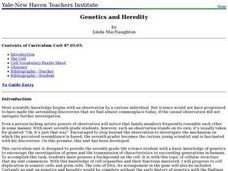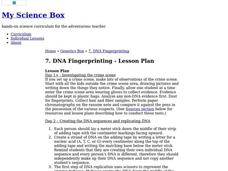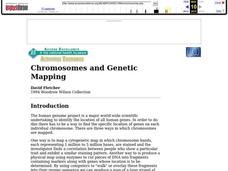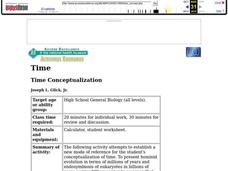Curated OER
Analysis of Data
Learners analyze DNA banding patterns for similarities and differences among individuals and between populations. They examine individual prepared gels then pool the class data to come to an overall conclusion.
Curated OER
Biology: Genetics and Heredity
Seventh graders explore the connection between genetics and heredity by examining the cellular structure. Among the numerous activities to engage students are drawing DNA molecules, vocabulary puzzle sheets, and predicting possible...
Curated OER
Genetic Analysis
Students formulate a hypothesis regarding the validity of the current status of the Arizona Hedgehog cactus as a distinct variety of cactus. They design a procedure to isolate DNA from the tissue of plants, given a list of chemicals and...
Curated OER
DNA Modeling
Students study DNA and its nucleotides. They manipulate paper nucleotides of DNA and investigate how the molecule is produced. Paper versions of sugars, phosphates, and nitrogen bases included.
Curated OER
DNA Fingerprinting
Students discuss DNA Fingerprinting and gel electrophoresis before participating in a crime solving activity. Students simulate their DNA using adding tape and complete the steps necessary to do a gel electrophoresis. They discuss the...
Curated OER
DNA Models
Students create DNA models. Using puzzle pieces to represent the parts of a DNA strand, they put together a segment of DNA. Once everyone has completed their individual strand, they being linking with other students using tape. Class...
Curated OER
Who Is It?/Who Done It?
Students conduct an experiment that allows them to assess individual differences in random DNA sequences and apply those differences when solving a forensic problem. After discussing the polymerase chain reaction and its use to identify...
Curated OER
What Does Dna Look Like?
Young scholars build DNA strands and practice base pairing rules using an interactive website in this technology-based instructional activity for a high school science class. This instructional activity includes links to the interactive...
Curated OER
DNA and Protein Synthesis
Tenth graders work with a partner, and copies of the attached worksheet "Amino Acid Codon Table" They discuss ways an organism, obtains and uses proteins. Students view a teacher prepared DNA strand banner, and record the complementary...
Curated OER
Genetics and Heredity: The Next Generation
Tenth graders work in teams to order events of DNA transcription and translation protein synthesis. In the second lesson, they put the steps of mitosis and meiosis in order using a concept map poster. They use modeling clay to create...
Curated OER
Mendelian and Non-Mendelian Heredity
Tenth graders discuss their physical features, and why they look the way they do. They listen as the teacher discusses DNA, alleles, and dominant or recessive genes. Students perform an experiment with different colored markers...
Curated OER
DNA Model
Students are able to construct a candy model of DNA. They are able to list all of the parts of DNA that they investigated earlier. Students are able to describe what each part of DNA does. They create an edible model of DNA strands.
Curated OER
Science Lesson: Chocolate Flavored Cherries
Young scholars are able to identify start and stop sequences in DNA. They are able to model using restriction enzyme and ligase to remove sections of DNA and reattach them. Students are introduced to the process of recombinat DNA...
Curated OER
Gene Puzzles
Young scholars come to understand that in sexually reproducing organisms, such as humans, typically half of the genes come from each parent.
Students examine a fictional pedigree and determine which gene is responsible for a given trait....
Curated OER
Nucleic Acids and Protein Synthesis
Tenth graders complete a vocabulary assignment based on terms in the unit. They complete appropriate worksheets as each section of the unit is completed. They participate in classroom discussions. They construct a model of a DNA molecule.
Curated OER
Simulation of Gene Splicing
Learners use the exercise as a prelude to a "wet" lab or as a substitute for such a lab. It correlates well with colony transformation labs. This lab is recommended for students what have difficulty with the abstractions that genetic...
Curated OER
Ethical Decision Making Model
Students consider the factors that relate to decisions regarding genetic disorders. They read case studies and complete a provided Bio-Ethical Decision-Making Worksheet.
Curated OER
Sequencing the Cystic Fibrosis Gene: A Simulation
Ninth graders use this activity to simulate the sequencing of gene and to detect the presence of possible genetic defects. They use diagrams that represent bands of nucleotides in order to determine the sequence of a small piece of the...
Curated OER
Chromosomes and Genetic Mapping
Students are introduced to mapping by crossover frequency. Genes travel as packaged trains on chromosomes. They use this experiment, genetic mapping assignment, that allow students to quickly complete the assignment and yet examine the...
Curated OER
Codon Bingo
Students participate in a stimulating game that involves deciphering the genetic code. They practice transcription and translation of codons while playing the game.
Curated OER
Discovering DNA Structure
Students work in cooperative groups of four and manipulate paper nucleotides to discover the structure of DNA. They model DNA and sing the DNA song to review concepts. Lyrics to song included in lesson plan.
Curated OER
Macro-DNA: Doing DNA Fingerprinting
Students explore gel electrophoresis using paper models. They model DNA sequences and shade the boxes on their Gel Electrophoresis Sheet which represent the individual fragments.
Curated OER
DNA Sequencing Simulation
Students explore the Sanger sequencing method which produces a nested set of radioactive fragments from a template strand. They simulate the Sanger method of sequencing DNA, both visually and kinesthetically.
Curated OER
Time Conceptualization
High schoolers use this activity to establish a new mode of reference to the conceptualization of time. To present hominid evolution in terms of millions of years and endosymbiosis of eukaryotes in billions of years carries little...

























